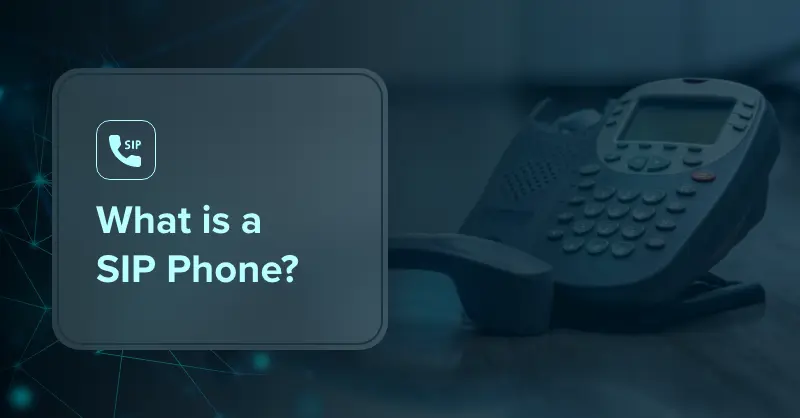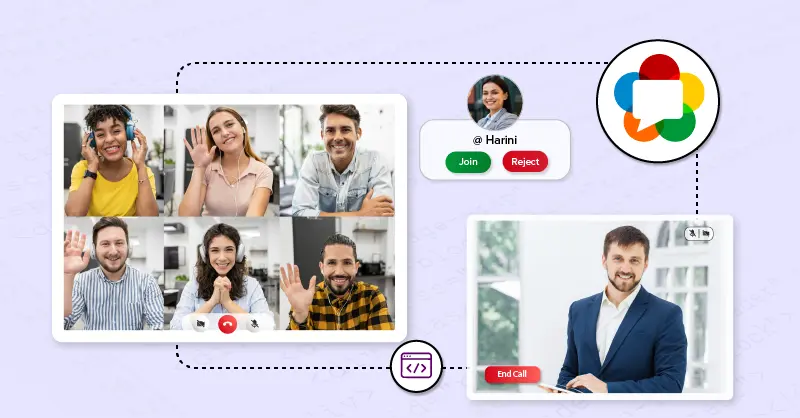What Are SIP Phone, Types, Features & Top IP Phones

A quick walk-through of what a SIP phone is, its types, features, and the best picks
Do you remember those old traditional phones that needed to be connected to a huge phone exchange to contact another person?
So, where did they actually go?
Evolution: IP phones were discovered and replaced so easily.
These IP phones (or SIP phones) do not require those complex wires. They simply need an internet connection.
In this guide, we’ll explain exactly what a SIP phone is, how it works to make phone calls, and which models are likely to work best for you.
This article will walk you through what exactly a SIP phone is, its types, features and list of the best IP phones.
So, let’s get started!
Table of Contents
What Is A SIP Phone?
A SIP phone is a communication device that uses the internet for making and receiving calls, unlike traditional wired phones. It uses a technology called VoIP to connect calls through the internet, costs less, and comes with a wide range of features.
When you look at the two main types of SIP phones – there are hardware SIP phones and software SIP phones.
The first type, hardware SIP phones, which look kind of the regular office phones that we use on a daily basis. These devices plug into the internet and connect directly to online phone services.
Once you’ve set them up, they maintain a constant connection to the service provider, which means you can use them any time.
The second type, software SIP phones, are typically the software programs that you can install on your computer or smartphone.
They’re typically very user-friendly; you simply download the app, enter your account details, and you’re ready to start making calls.
Here is a deeper look into the differences, for your understanding:
| Feature | Hardware SIP Phone | Software SIP Phone |
|---|---|---|
| Physical Form | Dedicated physical device | Software application on a computer, tablet, or smartphone |
| User Interface | Physical buttons and display | Graphical user interface (GUI) on device screen |
| Audio Quality | Typically superior due to specialized hardware | Dependent on device’s audio capabilities |
| Security | Built-in security features | Reliant on device’s operating system and security software |
| Reliability | Generally more reliable | Can be affected by device performance and software issues |
| Cost | Higher initial cost | Lower initial cost, but ongoing software expenses may apply |
| Portability | Limited, requires physical connection | Highly portable, usable on any compatible device |
| Features | Often includes voicemail, call forwarding, call waiting | Features depend on software capabilities and integrations |
| Deployment | Requires physical installation and configuration | Easier deployment, can be installed remotely |
| Scalability | Limited, requires additional hardware | Highly scalable, easily added or removed |
The Concept Of SIP Calling
As discussed earlier, Session Initiation mechanism (SIP) is nothing but the signaling mechanism that is used to start, stop, and manage multimedia communication sessions. Put in simpler terms, it’s the language that gadgets use to connect and initiate online calls.
How SIP Calling Works
When you make a SIP call, here’s what happens:
1. Call Initiation
- A SIP INVITE message is sent to a SIP server by your SIP-enabled device (such as a computer, hardware phone, or softphone).
- Information about the call, including the caller’s name, the recipient’s number, and the preferred media types (voice, video), is included in this message.
2. Setting up the Call
- A SIP INVITE message is sent to the recipient’s device by the SIP server after locating their SIP address.
- The receiver replies to the caller with a SIP 180 Ringing answer if they are available.
- A SIP 200 OK message is issued and the call is established as soon as the receiver replies.
3. Media Transfer
- Using codecs, audio and video data is transformed into digital packets and transmitted over the internet.
- The call session is still being managed by SIP, which also takes care of call quality, jitter buffering, and echo cancellation.
4. Call Termination
- Following the call, one party sends a SIP BYE message and the other responds with a SIP 200 OK to confirm.
Now, we know how exactly SIP Calling works. But, how do they exactly stand out from the traditional calling?
Here are the differences:
| Feature | Traditional Phone Calls | SIP Calling |
|---|---|---|
| Infrastructure | Physical copper wires or fiber optic cables | Internet connection |
| Technology | Analog or digital circuit switching | Packet switching |
| Cost | Typically higher monthly fees | Lower monthly fees, often pay-per-use |
| Features | Limited to basic calling features | Rich feature set including voicemail, call forwarding, conference calling, etc. |
| Quality | Can be subject to noise and interference | Generally better quality, especially for long-distance calls |
| Flexibility | Limited to physical phone lines | It can be used on various devices and locations |
What Features Can You Find In A SIP Phone?
Here are the features you need to look for in a SIP phone if you are trying to use them for your business.
1️⃣ Core Features
- Make and receive calls from your computer or mobile phone.
- Manage your contacts easily from one place.
- Forward calls to another number, voicemail, or multiple phones.
- Enjoy clear calls with HD audio quality.
2️⃣ Advanced Features
- Call recording for training, reference, or quality assurance.
- Use your phone on Wi-Fi without needing a traditional phone line.
- Multiple phones can ring for the same incoming call (Shared Call Appearance).
- Power your phone with your network cable (Power over Ethernet or PoE).
- Play music or messages while callers wait (On-Hold Music).
- Customize your caller ID to show your business name or department.
- Integrate with email, chat, and video conferencing (Unified Communications).
- Automatically route callers to the right person or department (Auto-Attendant).
3️⃣ Additional Features
- Video calling for face-to-face interactions.
- Call waiting to manage multiple incoming calls.
- Call transfer to connect callers to different parties.
- Do Not Disturb mode for uninterrupted focus.
- Call history for tracking and reference.
- Conference calling to host group conversations.
- Voicemail-to-email for convenient message access.
- Find me/follow me to route calls based on your location.
- Interoperability with other communication systems.
What Are The Types of SIP Phones
SIP phones have completely changed corporate communications because they use the Session Initiation Protocol (SIP) to make and receive calls over the internet. However, when you compare it to conventional analog phones, they provide a versatile and affordable option.
1️⃣ Hard Phones
Hard phones are physical devices that look like regular phones but operate without an internet connection. Although Ethernet cables are usually used to connect them to a network, they may also include Wi-Fi or Bluetooth capabilities.
Types of Hard phones
- Basic: These entry-level phones come with standard features including call hold, speakerphone, and dial pad. They are frequently utilized for standard office communication requirements or in contact centers.
- Intermediate: These phones expand on the basic model with capabilities including voicemail integration, call transfer, and directory access. They are appropriate for a larger group of users at an institution.
- Advanced: These top-of-the-line phones are equipped with features like big color displays, capability for numerous lines, sophisticated call management, and connectivity to other business apps. Executives and those working in intricate communication settings frequently utilize them.
- Conference telephones: These phones are usually equipped with speakerphones, microphone arrays, and Bluetooth connectivity for seamless pairing with mobile devices. They are specifically made for use in conferences and group conversations.
2️⃣ Softphones
Software programs known as “softphones” allow tablets, smartphones, and PCs to function as phones. Due to their ability to be used on any internet-connected device, they offer flexibility as well as mobility.
Types of Softphones
- Desktop softphones: Made for laptops and PCs, these softphones offer capabilities like voicemail, contact management, and call history that mimic regular phone service.
- Mobile softphones: These are apps that run on for smartphones and tablets that provide on-the-go communication and integration with mobile device capabilities.
- Web-based softphones: These softphones don’t require software to be installed because they can be accessed via a web browser. While this choice offers the greatest versatility, it might not be as flexible as desktop or mobile softphones.
Important Things To Look For When Choosing A SIP Phone
If you are all set to get SIP phones for your business operations, here are some 6 key factors you must not miss out.
- Network infrastructure: Make sure your network, particularly for softphones, can manage the extra data traffic that SIP phones create.
- Compatibility of devices: Make that the SIP phone you’ve selected works with other communication platforms and your VoIP service provider.
- Features: Take into account the particular features that are necessary for your personal or professional use, such as video capabilities, conference calling, and call recording.
- Security: Use strong passwords, firewalls, and encryption, among other effective security measures, to safeguard critical data.
- User experience: To guarantee employee happiness, assess the usability and user interface of various SIP phone choices.
- Cost: Look at the up-front and continuing expenses for hardware, software, and maintenance associated with hard phones versus softphones.
Top 5 SIP Phones For Businesses And Enterprises
1. Poly VVX 401
The Poly VVX 401 is an entry-level SIP phone designed for basic communication needs. Its compact size and intuitive interface make it suitable for small businesses and individual users.
- Compatibility: Compatible with most SIP platforms, offers PoE support.
- Features: HD audio, hands-free speakerphone, call transfer, call hold, and caller ID.
- Ease of Use: Simple setup and user-friendly interface.
- Build Quality and Design: Compact and durable, with a basic design.
- Security: Supports SRTP for secure communication.
- Price: Budget-friendly.
- Warranty and Support: Standard warranty with reliable customer support.
- Scalability: Suitable for small-scale deployments.
- Brand Reputation: Poly is a well-established brand known for reliable audio products.
- Reviews and Recommendations: Generally positive reviews for its simplicity and affordability.
2. Yealink SIP-T46S
The Yealink SIP-T46S is a mid-range SIP phone offering advanced features for professionals. Its large color display and customizable interface enhance user experience.
- Compatibility: Wide compatibility with SIP platforms, supports PoE.
- Features: HD audio, Gigabit Ethernet, Bluetooth, Wi-Fi, and integrated Bluetooth headset.
- Ease of Use: Intuitive interface with customizable softkeys.
- Build Quality and Design: Sleek design with a high-quality build.
- Security: Supports SRTP, HTTPS, and TLS for secure communication.
- Price: Mid-range pricing.
- Warranty and Support: Comprehensive warranty and reliable support.
- Scalability: Suitable for medium-sized businesses.
- Brand Reputation: Yealink is a reputable brand known for innovation.
- Reviews and Recommendations: Positive reviews for its feature set and audio quality.
3. Cisco IP Phone 8811
The Cisco IP Phone 8811 is a high-end SIP phone designed for executive-level users. It offers exceptional audio quality, a large color display, and advanced call handling features.
- Compatibility: Compatible with Cisco Unified Communications Manager and other SIP platforms.
- Features: HD audio, Gigabit Ethernet, Bluetooth, Wi-Fi, and integrated Bluetooth headset.
- Ease of Use: Intuitive interface with customizable softkeys.
- Build Quality and Design: Premium build quality with a sleek design.
- Security: Robust security features including SRTP, HTTPS, and TLS.
- Price: High-end pricing.
- Warranty and Support: Comprehensive warranty and dedicated support.
- Scalability: Suitable for large enterprises.
- Brand Reputation: Cisco is a leading provider of networking solutions.
- Reviews and Recommendations: Positive reviews for its performance and feature set.
4. Grandstream GRP2600
The Grandstream GRP2600 is a cost-effective SIP phone with a focus on basic functionality. It is suitable for small businesses and remote workers with limited communication needs.
- Compatibility: Compatible with most SIP platforms, offers PoE support.
- Features: HD audio, hands-free speakerphone, call transfer, call hold, and caller ID.
- Ease of Use: Simple interface, easy setup.
- Build Quality and Design: Basic design with a focus on functionality.
- Security: Supports SRTP for secure communication.
- Price: Budget-friendly.
- Warranty and Support: Standard warranty with customer support.
- Scalability: Suitable for small-scale deployments.
- Brand Reputation: Grandstream is a known provider of VoIP solutions.
- Reviews and Recommendations: Generally positive reviews for its affordability and basic features.
5. Avaya IP Phone 9601
The Avaya IP Phone 9601 is a mid-range SIP phone with a focus on user experience and productivity. It offers a balance of features and affordability.
- Compatibility: Compatible with Avaya communication platforms and other SIP platforms.
- Features: HD audio, Gigabit Ethernet, Bluetooth, and customizable softkeys.
- Ease of Use: Intuitive interface with a user-friendly design.
- Build Quality and Design: Durable build with a modern aesthetic.
- Security: Supports SRTP for secure communication.
- Price: Mid-range pricing.
- Warranty and Support: Comprehensive warranty and customer support.
- Scalability: Suitable for medium-sized businesses.
- Brand Reputation: Avaya is a well-established provider of communication solutions.
- Reviews and Recommendations: Positive reviews for its user experience and feature set.
How To Choose Your SIP Provider
Choosing the best SIP phone supplier is essential for companies looking to cut expenses and improve communication effectiveness. When making this choice, you need to take a number of things into account.
Evaluate Your Business Needs:
- Size and structure of your organization: Determine whether you require a basic system or a complex solution.
- Features: Identify essential features such as call forwarding, voicemail, conference calling, and integration capabilities.
- Scalability: Consider your business’s growth plans and the provider’s ability to accommodate expansion.
- Budget: Establish a clear budget to guide your selection process.
Compare Provider Offerings:
- Features and pricing: Evaluate the features offered by different providers and compare pricing plans.
- Reliability and uptime: Consider the provider’s track record of service reliability.
- Customer support: Assess the quality of customer support services available.
- Security: Prioritize providers that offer robust security measures to protect sensitive data.
Consider A Comprehensive SIP Solution Provider
Rather of concentrating just on SIP phones, you can also think about collaborating with a full SIP solution provider. SIP trunking, unified communications, and contact center solutions are just a few of the more extensive services that these vendors provide.
You may get cost savings, improved operational efficiency, and access to integrated services by combining all of your communication requirements under one supplier.
After all, an ideal SIP phone supplier is one that fits the unique needs and objectives of your company. All you need to do is – thoroughly assess your needs and compare supplier options to make an informed choice that optimizes your communication infrastructure.
Related Articles:
- 10 Best VoIP Phones For Your Business: Full Review (2025)
- What is SIP Calling & How Does It Work?
- What is VoIP Phone? – A Complete Guide in 2025 for Beginners
- Top 5 Benefits of VoIP Call Center Solution In 2025
- List Of SIP Trunk Providers For All Types Of Businesses
Looking to Build Your Voice Chat App
Get our enterprise-grade communication solution, that can be set up on your company servers.
Contact Sales100% customizable
White-label solution
Full source code





Thank you for sharing such amazing posts, looking forward to read more your articles.
It’s nice. Could you tell me are there any security issues associated with using SIP phones, and how can they be mitigated?
This is an excellent article! Can you explain on the differences between SIP phones and traditional analog phones?
Hi,
This blog is so informative, I’d like to know how about the basic features does SIP Phone provide?